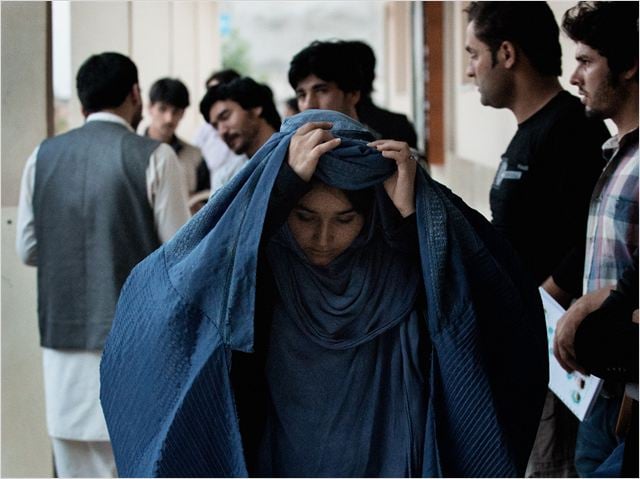By Alex Deleon <filmfestivals.com>
"Zwischen Welten" (Between Worlds) a Stark new drama about a German military unit on a peacekeeping mission in a most inhospitable Afghan village has Golden Bear written all over it.
It's German, it's political, it's timely, it's depressing, it's unhappy, it's a damn well made military thriller -- and the director, Feo Aladag, is a woman ~ what more could a Berlinale Jury ask for! Of course there are other emotionally draining films in contention, and I haven't see all of them, but if I were a betting man this is the one I'd be betting on.
Director Feo Aladag (née Feodora Schenk), 42, is an Austrian actress, writer, director, producer. She has 34 acting credits going back to 1996, mostly in TV series but this is only her second directorial effort and what an effort it is -- a truly gripping tale of German soldiers having to cope with the open hostility of the people they are supposedly protecting from the Taliban. It centers on the moral dilemma of a young German officer (Ronald Zehrfeld) who has already lost a brother in this crazy civil war and goes against orders to leave his command post in order to rush a young Afghan woman to the German military hospital before she bleeds to death -- victim of a driveby shooting, presumably the Taliban, but maybe others in a situation where nobody really knows who the enemy is any more.
Actress Saida Barmaki looks very much like Malala Yousafzai, the Pakistani girl who inspired the world after surviving a Taliban bullet to the head last year. In the film she is the sister of interpreter Tarik, who is on the Taliban shit list as a collaborator. (Mohamad Mohsen)

Saida Barmaki, interpreter's sister in the film
Four languages are heard in the film, German, English, Dari, the Persian dialect of hero Jesper's interpreter, and Pashto, the majority Afghan language of the leader of the ragtag anti-Taliban force holding the village.
A cultural difference becomes a bone of contention between the Germans and the Afghans when a cow wanders into the barb wire of their compound and is shot to "put it out of its misery". The owner of the cow demands a redemption of 500 €uros, because the cow is his only means of livelihood and he holds the Germans responsible. Putting animals out of their misery is apparently not part of their culture. The sum effect of the film is to force western viewers to ask themselves, "What the hell are we doing in their country, anyway?" -- The pic was strongly applauded, at the Haus Der Deutschen Festspiele cinema, which is a drag to get to by U-Bahn far from the festival center of Potsdamer Platz. However, so many of the hot ticket films are being shown there that this trip to the festival sticks is nearly unavoidable. This one was certainly worth it!
Praia do Futuro, (Beach of the Future) a Brazilian German coproduction is another competition entry. Helmer Karim Aïnouz a Brazilian-Algerian 48, is a film director and visual artist. Aïnouz's first feature debut, Madame Satã, premiered in 2002 at Cannes. He is from the northeastern Brazilian state of Ceará on the Atlantic coast and that is where this film opens before moving to Germany to follow the trail of its lovers, Donato, Brazilian, and Konrad, a German motorcycle tourist in Brazil. Donato is a lifeguard on this most dangerous ocean beach and saves Donato from drowning, then immediately becomes his lover. So this is basically a tale of gay masculine love between two macho types you wouldn't take for gay and that is maybe the message of the movie. "You can't tell a gay from his cover" -- The homosex on screen is so realistic that it looks non-simulated ~ these guys were really into their respective roles as far as sex is concerned. However I found neither actor very interesting as characters so I left soon after the first big blowjob. "Nymphomaniac" this not, but it may be in contention for one of Berlin's famous Teddy prizes -- The Berlin Teddy Bear sidebar is the mother of all the Gay and Lesban festivals that now abound around the globe.
A Rare Indian Gem Restored and Revived
The third film of day seven was a restored Indian movie from 1977 called ."Ghashiram Kotwa". The only print in existence was right here in Berlin, subtitled in German when the film was originally shown at the Berlinale in 1978. The print was painstakingly restored here by German technicians and the German subtitles replaced my English ones. Truly an act of resurrection as there is no print of the film anywhere else, not even in India! More on this piece of celluloid archeology tomorrow.















